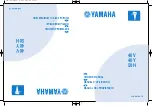
Chapter 2: Installation
2-7
2-4 Installing DIMMs
Note:
Check the Supermicro web site for recommended memory modules.
Warning:
Exercise extreme care when installing or removing DIMM
modules to prevent any possible damage. Also note that the memory
is interleaved to improve performance
Memory Support
This motherboard supports non-ECC Unbuffered Dual/Single Channel DDR3 1600
MHz up to 4GB in 2 DIMMs or DDR3 1333/1066/800 MHz up to 8GB in 4 DIMMs
(See notes 2 and 3). Populating DIMM1A, DIMM2A, and/or DIMM1B, DIMM2B
with memory modules of the same size and of the same type will result in dual
channel, two-way interleaved memory which is faster than the single channel, non-
interleaved memory.
Notes:
Due to the OS limitations, some operating systems may not show more than
1.
4GB of memory.
Both Unbuffered ECC and Non-ECC memory modules will boot up. How-
2.
ever, ECC functionality is not supported on this board.
The X7SBT/X7SBT-10G supports DDR3 up to 1600 MHz. You can only
3.
install up to two 1600 MHz modules with one module in DIMM1B slot or
DIMM2B slot or with two modules in both DIMM1B and DIMM2B slots
Due to memory allocation to system devices, memory remaining avail-
4.
able for operational use will be reduced when 4 GB of RAM is used. The
reduction in memory availability is disproportional. See chart on following
page. For Microsoft Windows users: Microsoft implemented a design change
in Windows XP with Service Pack 2 (SP2) and Windows Vista. This change
is specifi c to the Physical Address Extension (PAE) mode behavior which
improves driver compatibility. For more information, please read the following
article at Microsoft’s Knowledge Base website at: http://support.microsoft.com/
kb/888137.















































